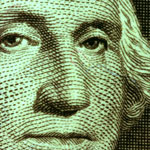Trusting Banks as Far as You Can Throw Them
06/17/09 Tampa Bay, Florida I was kind of dozing, idly dreaming of playing golf, where if I wasn’t putting the ball right into the cup from 25 feet away, then I was chipping it in from 25 yards out, wowing the crowd with deft wedge action, whereupon my caddy, a beautiful girl in a bikini and stiletto heels, would say, “Oooh! Nice one! You are so good that it gets me hot! I am panting for you, my Hot Mogambo Golfing Stud (HMGS)!”
Suddenly, I was jolted rudely awake by alarms ringing in the Mogambo Bunker Of Paranoid Delusions (MBOPD) at the news of a drop of $40 billion of Total Fed Credit last week. Wow! This is the “money” that magically appears, literally “out of thin air, as a new credit on the books of the banks, which they can then loan out some Huge Freaking Multiple (HFM) of that little bit of new credit, thus creating lots and lots of new money.
And this huge $40 billion downward swing of Total Fed Credit in one week is a Big Freaking Bunch (BFB), where the total effect on the banks is the reciprocal of the fractional reserve ratio, which is at least 10 times as much according to the classical textbook examples, but more likely a thousand times as much, seeing as how the Federal Reserve itself says that total bank assets are now a whopping $12.030 trillion and total bank liabilities are $10.780 trillion, against which the banks are only “required” to have $57.622 billion as reserves! Hahaha!
So what does that make the fractional reserve ratio? 187-to-one? Hahaha! We’re freaking doomed by out-of-control fractional-reserve banking!
And in that regard, the M1 and M2 money supplies are still growing, with M1 up 17% over last year and now hitting $1,596.2 billion ($1.696 trillion) and M2 up 8% from this time last year, now hitting $8,327.9 billion ($8.327 trillion).
Perhaps this is the reason the internationalforecaster.com quotes Nassim Nicholas Taleb, economist and author of the terrific book The Black Swan, as saying, “Bank nationalizations are ‘absolutely necessary’ to stop them damaging the financial system further with more losses.”
His sentiments are obviously echoed by New York University Professor Nouriel Roubini, who actually says the majority of U.S. banks are “insolvent”.
And as if anyone had to be told that bankers and politicians cannot be trusted, Mr. Taleb goes on, “You cannot trust the banks in taking risks,” and because we stupidly did, we now “have a very strange situation in which it’s the worst of capitalism and socialism, a situation in which profits were privatized and losses were socialized. We taxpayers have the worst.”
And one of the reasons that you can’t trust the banks is revealed by Bloomberg.com when it’s reported that one of the Federal Reserve morons, Dallas district-bank President Richard Fisher, said, “The Federal Reserve isn’t capable of offsetting the ‘flood’ of U.S. Treasury borrowing with its bond-purchase program, which is helping to revive credit markets.” Hahaha!
I got a Hot Mogambo News Flash (HMNF) for this dork: yes they can! There is nothing to stop them! Hahaha! Who’s going to stop the Federal Reserve from creating all the money that the federal government wants to borrow, and then the Fed using the money to buy all the new government debt? Hahaha! You gonna stop them? Hahaha!
Of course, he may be saying this because he and his Fed moron buddies have screwed everything up and he doesn’t want to talk about that, or how Mises.org reported that “The Federal Deposit Insurance Corporation (FDIC) list of problem banks grew to 305 in the first quarter, the highest number since 1994,” to which they then ominously added that “but of course the names of those banks are not released so that depositors can be forewarned.”
This is probably why msnbc.com had the headline “Most Banks Still Getting Weaker, Analysis Shows,” with an explanatory subhead of “First-quarter reports show bad loans increasing at 60% of banks,” which seems somewhat understated since later we read that “Overall, bad loans rose another 22 percent in the quarter.”
Even worse, it is even more lopsided than that, as, “While the 10 largest banks reported $10.2 billion in earnings for the quarter, the remaining 8,245 banks together lost $2.6 billion, according to the analysis,” which comes down to “One in five banks lost money in the quarter, and several lost big, weighing down the rest.”
The disintegration of the banking system, the fall of the dollar and the ruination of everything connected with them seems the perfect place to remind you that if you are not buying gold, silver and oil to profit from this governmental incompetence and stupidity, then there is something Very, Very Wrong (VVW) with you, which means you probably stopped paying attention already, which leaves the rest of us who ARE buying gold, silver and oil, meaning that there is nothing more to say about buying gold, silver and oil!
Whee! This investing stuff is easy!




